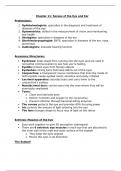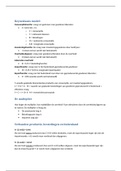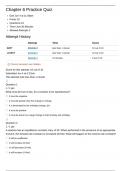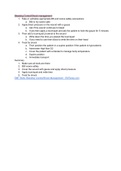Organizational Behavior
Chapter 1
1.1: The importance of interpersonal skills in the workplace:
Lack of interpersonal skills is the top reason why some employees fail to
advance
Companies that apply them, such as:
1. good place to work (Facebook, Qualcomm, etc.) generate superior financial
performance.
2. Developing managers interpersonal skills, keep high-performing employees,
which is hard to find and costly to replace
3. More quality workplace, relationships and job satisfaction, less stress and
turnovers.
1.2: Define Organizational Behavior:
Organizational Behavior is a field of study that investigates the behavior of the
persons that forms an organization with the purpose of improving
organization’s effectiveness.
Managers: They make decisions, allocate resources and directs
activities to others in order to achieve a goal.
Organization: A unit composed of two or more people who have the
same goal (companies, schools, hospitals, non-profits, etc.)
Managers don’t usually receive training. 25% admitted they were not ready
to lead others when they were given the role:
82% of the time, organizations choose the wrong candidate for manager
, There are 4 activities for a manager to be prepared better:
1. Planning:
Define goals.
Establish a strategy.
Plan how to coordinate these activities.
2. Organizing:
Determine what tasks are to be done.
With which order task will be done.
Who is to do each task.
How task will be grouped.
Who reports to whom.
Where things are going to take place.
3. Leading:
Motivate employees.
Direct their activities.
Select best way of communication.
Avoid-resolve conflicts.
4. Controlling:
Ensuring things are going as they should (not always as planned)
Monitor organization’s performance and compare it with previous
goals
Correct any significant deviation
Management Roles:
Mintzberg concluded that managers perform 10 different roles:
Interpersonal
This role is about hiring, training, motivating and disciplining
employees
Role: Description:
Figurehead Symbolic head, perform
number of routine duties.
Leader Motivates and directs the
employees.
Liaison (connection) Maintains outside network
that provides favors and info.
Chapter 1
1.1: The importance of interpersonal skills in the workplace:
Lack of interpersonal skills is the top reason why some employees fail to
advance
Companies that apply them, such as:
1. good place to work (Facebook, Qualcomm, etc.) generate superior financial
performance.
2. Developing managers interpersonal skills, keep high-performing employees,
which is hard to find and costly to replace
3. More quality workplace, relationships and job satisfaction, less stress and
turnovers.
1.2: Define Organizational Behavior:
Organizational Behavior is a field of study that investigates the behavior of the
persons that forms an organization with the purpose of improving
organization’s effectiveness.
Managers: They make decisions, allocate resources and directs
activities to others in order to achieve a goal.
Organization: A unit composed of two or more people who have the
same goal (companies, schools, hospitals, non-profits, etc.)
Managers don’t usually receive training. 25% admitted they were not ready
to lead others when they were given the role:
82% of the time, organizations choose the wrong candidate for manager
, There are 4 activities for a manager to be prepared better:
1. Planning:
Define goals.
Establish a strategy.
Plan how to coordinate these activities.
2. Organizing:
Determine what tasks are to be done.
With which order task will be done.
Who is to do each task.
How task will be grouped.
Who reports to whom.
Where things are going to take place.
3. Leading:
Motivate employees.
Direct their activities.
Select best way of communication.
Avoid-resolve conflicts.
4. Controlling:
Ensuring things are going as they should (not always as planned)
Monitor organization’s performance and compare it with previous
goals
Correct any significant deviation
Management Roles:
Mintzberg concluded that managers perform 10 different roles:
Interpersonal
This role is about hiring, training, motivating and disciplining
employees
Role: Description:
Figurehead Symbolic head, perform
number of routine duties.
Leader Motivates and directs the
employees.
Liaison (connection) Maintains outside network
that provides favors and info.











